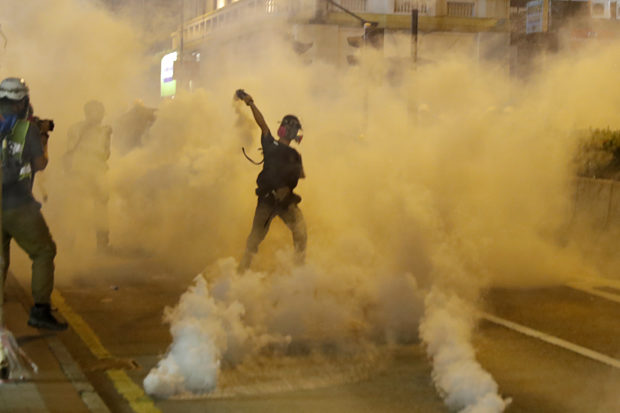Hong Kong protesters and police face off in familiar cycle

Credit to Author: ggaviola| Date: Sat, 03 Aug 2019 22:41:35 +0000
HONG KONG – On one end of a Hong Kong street, protesters dressed in black ducked behind umbrellas and makeshift barricades, occasionally throwing bricks or slinging rocks.
On the other end, police decked out in riot gear shouted warnings and fired tear gas.
As the late hours of Saturday stretched into the early hours of Sunday, neither side budged.
Standoffs between demonstrators and authorities have become a weekly occurrence in Hong Kong, a semi-autonomous Chinese territory that has been roiled by a summer of fiery protest.
What began as demonstrations against a now-suspended extradition bill has ballooned into a broader call for greater democratic freedoms and government accountability.
The now-familiar cycle of rallies, police interventions and clashes between the two sides have splintered the city. While tens of thousands marched Saturday through Mong Kok, a bustling shopping area, to call for an inquiry into alleged police brutality, another several thousand in a different part of the city gathered to show support for law enforcement.
At one rally, attendees chanted: “Support the Hong Kong police to strictly enforce the law!” At another, protesters yelled: “Police know the law and break the law!”
Several pro-democracy rally participants expressed disappointment in what they viewed as abusive and negligent behavior from police in recent weeks. After thugs dressed in white beat up people inside a commuter rail station, leaving 44 injured, Hong Kong residents accused the police of deliberately being slow to respond. Police, meanwhile, said their resources were stretched because of the ongoing protests.
“I feel so hurt,” said Zarine Chau, a 56-year-old security guard who was at the pro-democracy march. She said she rarely got involved in politics in the past, but felt moved to do so after seeing videos of police swinging their batons at protesters.
“Why doesn’t the government answer to us?” Chau asked.
Members of the movement have demanded the resignation of Hong Kong leader Carrie Lam. As with all the city’s chief executives, Lam was not elected by the general population but rather chosen by a committee dominated by pro-Beijing elites.
When Britain returned Hong Kong to China in 1997, the city was promised certain freedoms under the framework of “one country, two systems,” creating a distance between the territory and the Communist Party-ruled central government on the mainland. In recent years, however, some Hong Kong residents have accused Beijing of chipping away at their democratic rights as booksellers and activists have been arrested. The proposed extradition legislation would have allowed Hong Kong residents to be sent to the mainland to stand trial.
An undercurrent of fear toward the Communist Party has propelled the nearly two months of protests. After protesters defied police orders to end their Saturday march at a pre-approved time and place, some scaled a flagpole near the iconic Victoria Harbour, removed from it the Chinese national flag, and flung the flag into the water.
Shortly afterward, a 38-year-old protester named Paladin Cheng planted himself beside the poles with his own set of flags, which read “Hong Kong Independence.”
“We’re losing our freedom little by little,” said Cheng, who was clad in head-to-toe black with a black visor and face mask. “Those who don’t support Hong Kong independence will have no choice but to become Chinese.”
A similar act a few weeks ago infuriated authorities in Beijing. After another rally which did not disperse, some demonstrators threw eggs and black paint at the national emblem on the Liaison Office, which represents the mainland government in Hong Kong. China called the vandalism a “violent” act that challenged its authority.
Protests in Hong Kong have seen participation from all parts of society. In Mong Kok on Saturday, many shops along the protest route closed early, but those that remained open offered free water to participants. One corner shop had on prominent display their selection of umbrellas, a symbol of pro-democracy movements in the city. Several drivers yelled words of encouragement from the inside of passing cars even as they struggled to make their way through the crowded street./gsg